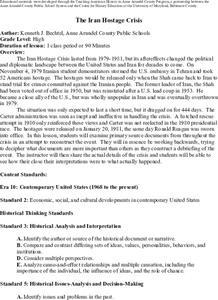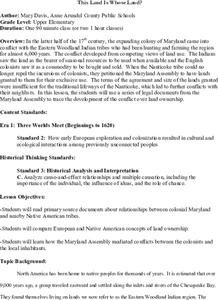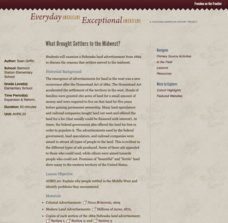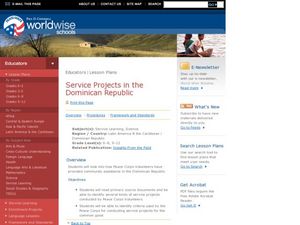Center for History Education
Maryland: A Middle Ground?
Is Maryland in or out? Using primary source documents that examine the state's geopolitical location, learners discuss whether the Old Line State is Northern or Southern to its core. The resource includes numerous documents and...
Center for History Education
Road to Revolution: How did Actions and Responses Lead to an Independent United States?
Using primary sources, maps, and an interactive M&M game, young historians examine the American revolution as if they were detectives trying to solve a crime. Resource includes graphic organizers and a final writing prompt to aid...
Center for History Education
The Tobacco Economy: How did the Geography of the Chesapeake Region Influence its Development?
Explore the relationship between geography and economy using primary sources. After examining wills, advertisements, and other primary sources, individuals consider how the Chesapeake Region came to be home first to indentured servants,...
Center for History Education
The Iran Hostage Crisis
While the Iranian Hostage Crisis was a watershed moment, few history classes take on the complex series of events leading up to it. Using declassified documents, including a hostage's diary, young historians create their own reports to...
Center for History Education
Debating Social Security: Understanding and Evaluating the Social Security Act of 1935
With throngs of Americans out of work and hungry, Franklin D. Roosevelt made the bold move to establish a social safety net with programs such as Social Security. The move was—and still is—controversial. Using documents from the 1930s,...
Center for History Education
The Freedmen's Bureau: Success or Failure?
What is freedom? The United States grappled with the question at the end of the Civil War after four million enslaved people were freed. Using circulars and images from the Reconstruction period, individuals examine how successful the...
Center for History Education
Daily Lives of Slaves - What Really Happened?
The stories of enslaved people are preserved forever thanks to the Great Depression. Budding historians explore slave narratives gathered by a federal government initiative to discover what life was actually like for enslaved people....
Center for History Education
This Land is Whose Land?
Whose land is it, anyway? Young scholars debate the question using primary sources from a case where Maryland indigenous people petitioned for land rights after they lost their original tribal lands. An included chart helps organize...
National Endowment for the Humanities
Imperialism and the Open Door
After the United States emerged as a global power, it began to muscle its way into trading agreements with China. Using primary sources, budding historians examine the Open Door policy, which emerged during this time. Primary sources and...
National Endowment for the Humanities
Creating the Office of the Presidency
The United States needed an executive power, but it wanted to avoid a monarchy. Using James Madison's notes on the Constitutional Convention, young historians look at the juggling act the Founding Fathers did to create a role for the...
National Endowment for the Humanities
The Question of Representation at the 1787 Convention
While the Constitution is considered enshrined today, its current form is the result of haggling at a secret convention in 1787. Using transcripts from the meetings and various plans as drafted by the delegates, class members unpack the...
Judicial Branch of California
A New Constitution….Your Turn!
It's the 1700s, and while returning home from the Constitutional Convention, pupils are propelled to 2777. The United States— emerging from a period of unrest and war—needs help developing a new constitution! Using the material from the...
Stanford University
King Philip's War
King Philip's War was the crescendo of a violent period between the Pequot and English colonists. Using documents from English settlers, including a contemporary report on the conflict, learners explore the little-known period. They then...
Stanford University
Boston Massacre
The Boston Massacre was a propaganda victory for those protesting British rule over the American colonies. By using images from Patriots, as well as the testimony of witnesses, scholars consider what may have happened on that fateful day...
Roy Rosenzweig Center for History and New Media
What Brought Settlers to the Midwest?
Drawn by promises of fertile land, thousands of settlers poured West because of the Homestead Act of 1862. By examining images of the ads that drew them westward, learners consider the motivations for movement. They also consider how the...
Curriculum Development Institute
Reconstruction and Development in Japan after WWII
After World War II, Japan faced the task of rebuilding—under the watchful eyes of the Allies. Using a dice game and creative discussion strategies, class members consider the challenges facing Japan and changes the country underwent...
iCivics
DBQuest: The Nashville Sit-In Movement
What was it like to be a part of the sit-ins during the Civil Rights Movement? Learners consider the question and whether the protests were effective using an online documents-based investigation. The program allows for virtual...
Alabama Department of Archives and History
African American Life After the Civil War - Sharecropping
What is the sharecropping system? What role did it play in the post-Civil War economy of the South? Who were the sharecroppers? Who employed them? How were they paid? To answer these questions, kids examine a series of sharecropper...
Urbana School District
Knocking Down Fences
After reading The Other Side and guiding children through a picture walk, third graders investigate evidence of the civil rights movement. In the mini unit, 3rd graders analyze photographs of the past and make connections between...
Student Handouts
Guy Fawkes Night
What happened on the fifth of November that has prompted an annual, national commemoration in Great Britain? Young historians look at a traditional English rhyme and folk tale from the seventeenth century that describes the failed...
Curated OER
Using Primary Sources: Letters from the Presidents
Students find out about the minds and thoughts of presidents through reading their actual letters. They explore the personal lives of presidents. They answer questions about a primary source. They write essays.
Curated OER
Pictures from Korea: Shards of an Almost Forgotten Past
Students explore the Korean War through photography. In this Korean War lesson, students examine photographs taken by a soldier and respond to question about them.
Curated OER
After: A Study of Individual Rights
Use the dystopian novel After by Francine Prose to spark discussion about individual and student rights. Learners read the novel, evaluating how far a school can go to control its attendees. As they read, scholars fill out a chart...
Curated OER
Service Projects in the Dominican Republic
Learners examine the role of Peace Corps volunteers. In this service instructional activity, students investigate service projects that feature agriculture, small business, education, environmental education, and health concerns in the...

























